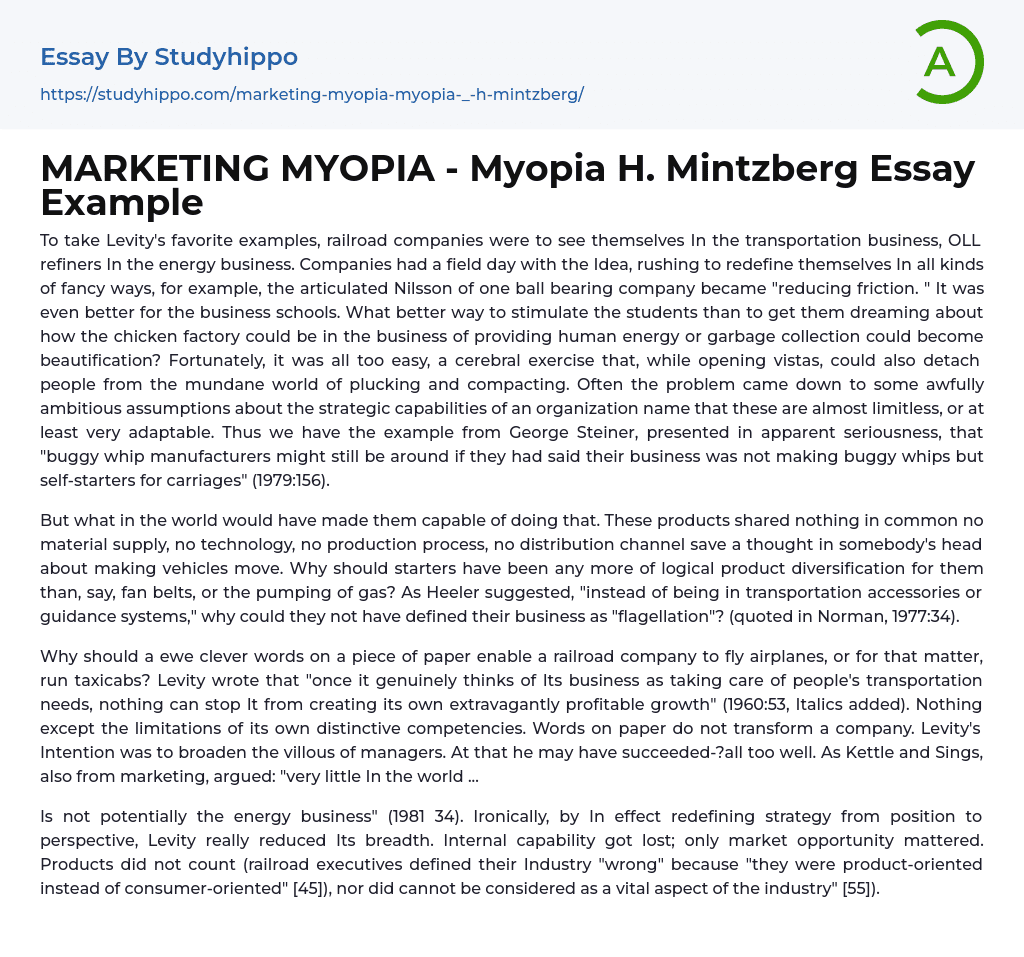Levity's favorite examples illustrate how companies can redefine themselves and their industries. For instance, railroad companies saw themselves as being in the transportation business, while oil refiners considered themselves part of the energy business. This idea prompted companies to come up with various fancy ways to redefine themselves. One ball bearing company, for example, presented its articulated Nilsson as a tool for "reducing friction." This concept was particularly exciting for business schools, as it encouraged students to think creatively. They imagined how a chicken factory could provide human energy or how garbage collection could contribute to beautification. Fortunately, this exercise was relatively easy and allowed individuals to escape the mundane tasks of plucking and compacting. However, ambitious assumptions about a company's strategic capabilities often arose from this exercise. People believed that an organization's potentia
...l was limitless or highly adaptable. To exemplify this notion, George Steiner humorously suggested that even buggy whip manufacturers could still be in business if they positioned themselves as producers of self-starters for carriages (1979:156).
Despite the lack of logical reasons, they managed to achieve such a feat even though their products were completely different. They had no similarities in terms of materials, technology, production process or distribution channels. The only shared aspect between these products was the concept of making vehicles move. Hence, it remains unclear why starters would be a more suitable choice for diversification compared to fan belts or pumping gas. As suggested by Heeler and quoted in Norman (1977:34), they could have defined their business as "flagellation" instead of being involved in transportation accessories or guidance systems.
Levity wrote in 1960 that if a railroad company truly
sees its business as taking care of people's transportation needs, it can create profitable growth. However, this growth is limited by the company's unique capabilities. Simply putting clever words on paper does not magically transform a company. Levity intended to expand managers' perspectives, which may have been successful according to Kettle and Sings, who also work in marketing.
In 1981, Levity claimed that the energy business was not potentially profitable. However, their change in strategy from position to perspective actually made their scope narrower. They disregarded internal capability and focused solely on market opportunity. This approach disregarded the importance of products, which railroad executives considered to be a crucial aspect of their industry. They believed that being consumer-oriented was more important than being product-oriented.
- Energy Development essays
- The elements essays
- Voltage essays
- Solar Energy essays
- Nuclear Energy essays
- Alternative Energy essays
- Advertising essays
- Audience Theory essays
- Competitor Analysis essays
- Consumer essays
- Marketing Management essays
- Marketing Mix essays
- Marketing Plan essays
- Marketing Research essays
- Marketing Strategy essays
- Point Of Sale essays
- Price essays
- Procurement essays
- Product essays
- Product Differentiation essays
- Promotion essays
- Promotion And Marketing Communications essays
- Retailing essays
- Trademark essays
- Anheuser-busch essays
- Brands essays
- Detergent essays
- Product Placement essays
- Research Design essays
- New Product Development essays
- Advertisement essays
- Brand essays
- Sales Promotion essays
- Advertising campaign essays
- Consumer behaviour essays
- Offer And Acceptance essays
- Wal-Mart essays
- Discover essays
- Cars essays
- Bicycle essays
- Rms Titanic essays
- Renault essays
- Truck essays
- chrysler essays
- The city essays
- Racing essays
- Atom essays
- Big Bang Theory essays
- Density essays
- Electricity essays




